A Publication of Churches Under Christ Ministry
Previous Lesson:
VIII. Roger Williams and Dr. John Clarke Go to England to Promote the Interests of Rhode Island; Dr. Clarke’s Book, Ill News from New England
Next Series of Lessons:
The Separates and Baptists in New England
Click here for links to all lessons on The Baptists in Rhode Island.
Click here to go to all written lessons.
Click here to go to the 3 1/2 to 6 minute video lectures.
For accompanying more thorough study from God Betrayed click here.
Jerald Finney
Copyright © February 27, 2018
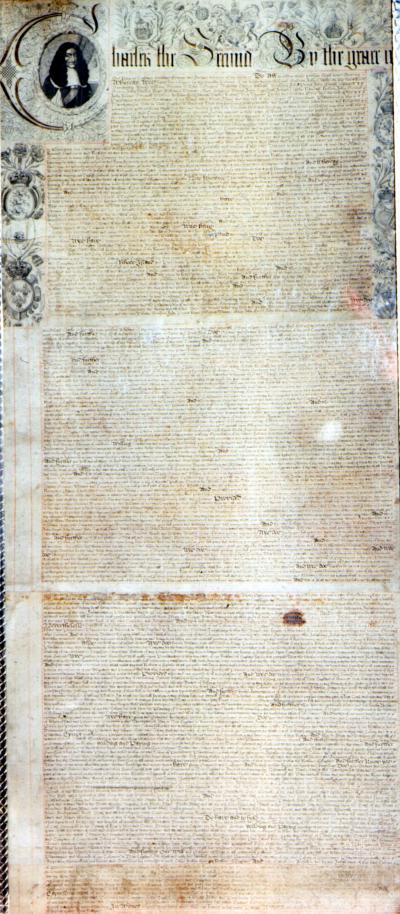
Mr. Clarke remained in England until, on July 8, 1663, he secured a new charter from Charles II. “By this Charter all the powers of government were conferred on the Colony, the King not having reserved to himself the right of revising its proceedings.”[1] This charter was in effect until the constitution, which was adopted in November 1842, became operative the first Tuesday of May 1843. In addition to other matters, the charter cleared up land disputes with Massachusetts and some of the other colonies, provided for the organization of the government, and provided for freedom of conscience.[2] That charter stated, in part:
- Inhabitants of Rhode Island “pursuing, with peaceable and loyal minds, their sober, serious, and religious intentions, of godly edifying themselves, and one another, in the holy Christian faith and worship, as they were persuaded … did … transport themselves out of this kingdom of England into America,” and did then “leave their desirable stations and habitations, and with excessive labor and travel, hazard and charge did transport themselves into the midst of Indian natives” … “whereby, as is hoped, there may, in time, by the blessing of God upon their endeavors be laid a sure foundation of happiness to all America: And whereas, in their humble address, they have freely declared, that it is much on their hearts (if they may be permitted) to hold forth a lively experiment, that a most flourishing civil state may stand and best be maintained, and that among our English subjects, with a full liberty in religious concernments; and that true piety rightly grounded upon gospel principles, will give the best and greatest security to sovereignty, and will lay in the hearts of men the strongest obligations to true loyalty: … and to secure them in the free exercise and enjoyment of all their civil and religious rights, appertaining to them, as our loving subjects; and to preserve unto them that liberty in true Christian faith and worship of God, … that no person within the said colony, at any time hereafter shall be any wise molested, punished, disquieted, or called in question, for any differences in opinion in matters of religion, and do not actually disturb the civil peace of our said colony.”[3] [Emphasis mine.]
The charter granted:
“unprecedented liberties in religious concerns. Moreover representation for the people and the limit of power to public officials provided a basic check and balance to popular sovereignty. The Royal Charter of 1663 proved to be distinctive, installing safeguards in the election process through the governing body of the State Assembly, made up of a governor, deputy-governor, assistants, and representatives from each of the towns,”[4] each elected by the people.
The most important Biblical principle of the government they founded was incorporated into the supreme law of the United States of America by the First Amendment to United States Constitution.
As to the effect of the Rhode Island government thus established, John Callender wrote in 1838:
- “The civil State has flourished, as well as if secured by ever so many penal laws, and in inquisition to put them to execution. Our civil officers have been chosen out of every religious society, and the public peace has been as well preserved, and the public counsels as well conducted, as we could have expected, had we been assisted by ever so many religious tests.
- “All profaneness and immorality are punished by the laws made to suppress them; and while these laws are well executed, speculative opinions or modes of worship can never disturb or injure the peace of a State that allows all its subjects an equal liberty of conscience. Indeed, it is not variety of opinions, or separation in worship, that makes disorders and confusions in government. It is the unjust, unnatural, and absurd attempt to force all to be of one opinion, or to feign and dissemble that they are; or the cruel and impious punishing those, who cannot change their opinions without light or reason, and will not dissemble against all reason and conscience. It is the wicked attempt to force men to worship God in a way they believe He hath neither commanded nor will accept; and the restraining them from worshipping Him in a method they think He has instituted and made necessary for them, and in which alone they can be sincere worshippers, and accepted of God; in which alone, they can find comfort and peace of conscience, and approve themselves before God; in which alone, they can be honest men and good Christians. Persecution will ever occasion confusion and disorder, or if every tongue is forced to confess, and every knee to bow to the power of the sword: this itself is the greatest of all disorders, and the worst of confusions in the Kingdom of Christ Jesus.
- “[T]his Colony with some since formed on the same model, have proved that the terrible fears that barbarity would break in, where no particular forms of worship or discipline are established by the civil power, are really vain and groundless; and that Christianity can subsist without a national Church, or visible Head, and without being incorporated into the State. It subsisted for the first three hundred years; yea, in opposition and defiance to all the powers of hell and earth. And it is amazing to hear those who plead for penal laws, and the magistrate’s right and duty to govern the Church of Christ, to hear such persons call those early times the golden age of Christianity.”[5]
Mr. Clarke, on his return to Rhode Island, was elected Deputy-Governor three successive years. “He continued the esteemed pastor of the first Baptist Church of Newport, till his death” on April 20, 1676.[6] Of Mr. Clarke, Isaac Backus wrote: He “left as spotless a character as any man I know of.”[7] “The testimony which Backus proceeds to give of the purity of [Mr. Clarke’s] character and to his good name, even among his enemies, has been fully corroborated by later writers.”[8] “To no man, except Roger Williams, is Rhode Island more indebted than to him.”[9]
“An eminent American historian justly observed:
- “The annals of Rhode-Island, if written in the spirit of philosophy, would exhibit the forms of society under a peculiar aspect. Had the territory of the State corresponded to the importance and singularity of the principles of its early existence, the world would have been filled with wonder at the phenomena of its early history.”[10]
An example of the manner in which Rhode Island honored the doctrine of freedom of conscience is the way they upheld the standard in regards to the Quakers. Other colonies persecuted the Quakers from 1656 until 1661. Massachusetts hanged four Quakers who returned to the colony after being banished. The Commissioners of the United Colonies threatened Rhode Island with cutting off all commerce or trade with them if Rhode Island did not likewise persecute the Quakers by enacting penal legislation against them. Rhode Island “refused, and pointed out that it had no law for punishing people because of their utterances ‘concerning the things and ways of God, as to salvation and to eternal condition.’”[11] The Commissioners of Rhode Island notified John Clarke. As a result, King Charles II ordered, “neither capital nor corporal punishment should be inflicted on Quakers, but that offenders should be sent to England.”[12] This decree of the King probably saved the lives of other dissenters.
Not all that was happening was for naught. Isaac Backus wrote, “It is readily granted that the sentiments of Mr. Williams and Mr. Clarke, about religious liberty, have had a great spread since that day, so that men of a contrary mind cannot carry their oppressive schemes so far now as they did then,”[13] but they still had a ways to go to achieve religious liberty. It was not until 1838 that John Callender declared “[t]he principles of religious freedom, which they [of Rhode Island] clearly and consistently maintained, are now the rule of action adopted by all Christian sects.”[14]
Endnotes
[1] John Callender, The Civil and Religious Affairs of the Colony of Rhode-Island (Providence: Knowles, Vose & Company, 1838), Appendix XXI, pp. 261-262.
[2] Isaac Backus, A History of New England With Particular Reference to the Denomination of Christians called Baptists, Volume 1 (Eugene, Oregon: Wipf & Stock Publishers, Previously published by Backus Historical Society, 1871), pp. 277-280.
[3] See Callender, Appendix No. XXI, pp. 241-262 for the complete charter; see also, James R. Beller, America in Crimson Red: The Baptist History of America (Arnold, Missouri: Prairie Fire Press, 2004), Appendix D, pp. 505-506.
[4] Louis Franklin Asher, John Clarke (1609-1676): Pioneer in American Medicine, Democratic Ideals, and Champion of Religious Liberty (Paris, Arkansas: The Baptist Standard Bearer, Inc.), pp. 78-79.
[5] Callender, pp. 163-164.
[6] Ibid., Appendix IX, p. 211.
[7] Backus, A History of New England…, Volume 1, p. 348.
[8] Ibid., fn. 1, pp. 348-349.
[9] Callender, p. 212.
[10] Ibid., Appendix XVI, p. 230, citing Bancroft’s History of the United States, vol. 1, p. 380.
[11] Leo Pfeffer, Church, State, and Freedom (Boston: The Beacon Press, 1953), p. 75, citing Evarts B. Greene, Religion and the State :(New York: New York University Press, 1941), pp. 24-25.
[12] Callender, Appendix XIX, pp. 234-236.
[13] Backus, A History of New England…, Volume 1, pp. 202-203.
[14] Callender, Appendix XIX, p. 238.


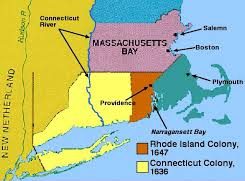



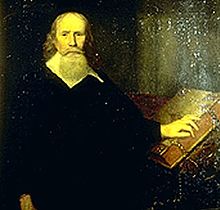



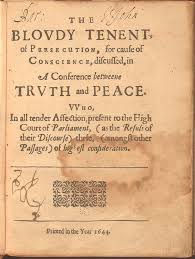







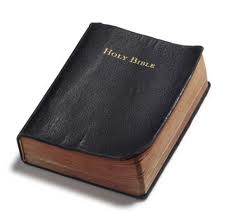

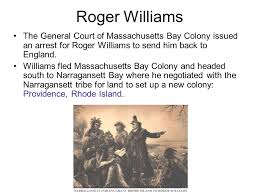 Mr. Williams remained at odds with the established church and government ministers in Massachusetts. He was accepted by the church at Salem, but that was blocked by the General Court of the Colony. Plymouth warmly received him into the ministry where he labored two years. Exercising their right under congregational governance, the church at Salem called him, over the objections of the magistrates and ministers, to be their settled teacher. At Salem, he filled the place with principles of rigid separation tending to anabaptism.
Mr. Williams remained at odds with the established church and government ministers in Massachusetts. He was accepted by the church at Salem, but that was blocked by the General Court of the Colony. Plymouth warmly received him into the ministry where he labored two years. Exercising their right under congregational governance, the church at Salem called him, over the objections of the magistrates and ministers, to be their settled teacher. At Salem, he filled the place with principles of rigid separation tending to anabaptism.